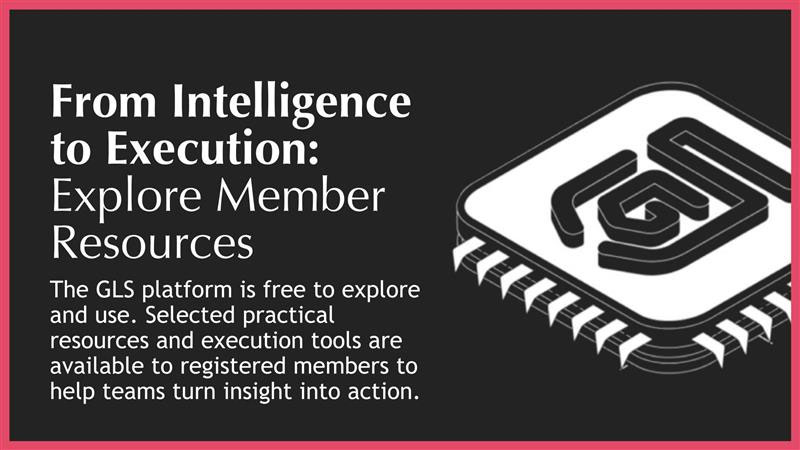Back
RPLV: Transformative Decision Making
Transforming Your In-House Legal Team To New Law
15 mins • 13 May 19

The vocational journey of the in-house lawyer has long since ceased to be an attractive safe harbor from the performance pressures of private practice – it is now as challenging and often more so.
In-house legal teams ("IHLs") all over the world face unrelenting pressure to achieve “far more with far less” for the businesses they serve, and to be able to positively demonstrate that they are doing so.
In the new era of empirical performance data, unlike private practice lawyers who can point to “billings”, in-house legal teams need to define and track the value they represent to their businesses.
In-house legal teams need a viable strategy to transform from “Old Law” to “New Law” operating conditions. For most, this journey will be about survival, but for the enlightened, it represents an incredible opportunity to shine.
Whilst a seemingly daunting task given the white noise and politics of the larger corporates that host most of the in-house legal community, taking simple effective steps often is all that is needed.
Here, we introduce GLS’s RPLV Decision-Making Framework to help guide your in-house team’s journey from Old Law to New Law, where so much more is possible with so much less.
RPLV decision-making is the basis upon which we develop all of our legal resource productivity solutions – all of which can be found at the GLS Legal Operations Centre.
The Current Challenge - Much More Achieved with Much Less
Much has been written about the challenges faced by In-House teams. As the audience reading this piece lives the experience every day, there is no need to cover things in-depth here.
Suffice it to say, in-house teams are required to service an exponentially increasing legal support and compliance workload with the same or fewer resources. This is now the new “norm’ and the pressure is on.
Using humor to make the point – today’s in-house job advert might look something like this:
- Our CFO does not like cost items
- You do not make us a profit
- We don’t like spending money on lawyers
- We only use law firms when we have to
- You must ensure we face no problems
- Limited support/resources to be provided
- Private practice hours guaranteed but less money
- If you succeed, then explain why you are needed
- Replacing you with AI/Automation is likely
- Don’t plan your weekends
- Limited tools and training provided

Even if law firms could cut their fees by 50% (which they cannot), their “time for money” model has proven them consistently to be unreliable partners for in-house teams seeking to bridge their chronic resourcing deficit.
The future of the in-house team depends entirely on its own ability to do far more for itself and with far less. It is up to the in-house legal team itself to re-define, re-task, re-skill, and re-engineer what it can achieve for itself.
Indeed the job advertisements for the New Law in-house teams going forward will increasingly accentuate the New Law skill sets set out below.
_(1).webp)
The Required Transformation Journey for In-House Legal Teams
The in-house community knows all too well that they need to be able to achieve more for themselves.
Almost every business we meet feels that their legal department tends to look like this…

In the New Law era, the In-House team must look more like this …

How quickly an In-House team starts this transformation journey, and how the process is managed, will directly determine what kind of future that team will enjoy in the New Law Era.
The key features of the In-House transformation journey are as follows:
- Reversing the polarity of the legal resourcing deficit
- Handling day-to-day legal grind with less time and effort
- Spending more time helping the business make money
- Being better able to support “high profile” X-factor projects
- Demanding “enduring” value from all external legal service providers
- Delivering a more sustainable and satisfying In-House vocational experience
- Transformation is about small and effective steps taken frequently – there is no Big Bang!
So how can this be achieved in view of the seemingly insurmountable financial, cultural, and resource-based restrictions facing most In-House teams, particularly in a large MNC?
RPLV - An Essential Decision-Making Framework for a New Law transformation
In-House teams need a simple, effective, and easy-to-implement strategy over which they can exert maximum control to guide their journey from the Old Law to the New Law.
Accordingly, GLS strongly recommends every in-house team adopt its entirely non-invasive and free RPLV decision-making framework as a means of driving maximum legal resource expression.

The Constituent Ingredients of RPLV are:
Resources: Cognisance of all available legal resources and a plan to optimize them
Prioritization: Decisions made by reference to an approved domain of responsibility
Leverage: Active consideration of legal resource leverage profile as part of the decision-making
Validation: Active consideration of the ability to validate associated resource performance outcomes
RPLV places In-House team decision-making into a strategic transformation framework which allows for small and effective resource optimization steps to be identified, and missteps to be avoided.
Moreover, a steady, incremental approach based on small successful steps led by the In-House team is the ONLY pathway for a successful New Law transformation as:
- In-House teams are actually best placed to “author” their own transformation plan
- change should come from within as most categories of legal resources are actually under-utilized
- foundational transformation can already be achieved with little to no expenditure
- the In-House team must deliver results that the rest of the business will want to support
Incidentally, RPLV is the same methodology that underpins the market-leading “legal resource productivity" solutions accessible via the GLS Legal Operations Centre.
In the balance of this piece, we will explain how RPLV works, along with how easy it is to implement RPLV decision-making.
In-House Legal Resources
The inviolable principle of a New Law transformation is that each and every class of legal resource deployed by a business must achieve optimal productivity expression.
Sadly, too many businesses view their legal resources in limited terms such as "headcount” and “external” budget – and in so doing deprive themselves of the ability to optimize.
Such an approach is like a professional sprinter training solely by running fast and disregarding core strength, explosiveness, visualization, flexibility, CO2 capacity, recovery, sleep, diet, routine, etc.
Accordingly, the essential pre-cursor to a successful New Law transformation journey is to identify the true scope and nature of legal resources available to the legal team.
GLS advocates that the in-house team must consider their legal resources using the below types of resource categorization, each of which can be optimized and uniquely combined for optimal effect.
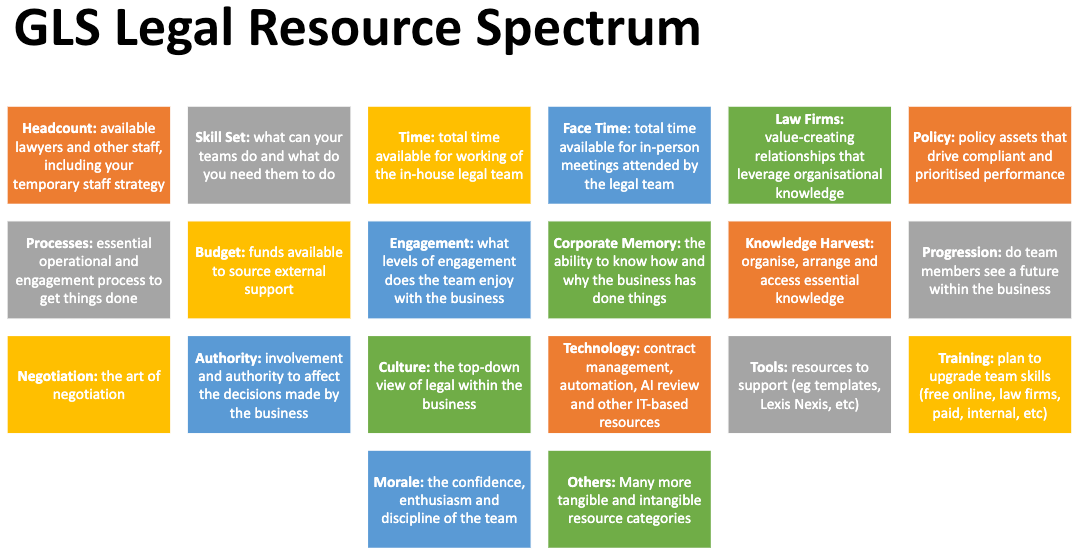
With this enhanced view of the available legal resources, the ability to make strategic resourcing adjustments that deliver multiplier performance outcomes is greatly enhanced.
Effective Prioritization and Legal Policy Assets
No In-House team has the resources to do everything that it needs to do so teams must focus on what will “move the needle” for their business and manage its finite legal resources accordingly.
If a legal team lacks clear policy assets defining the legal & compliance requirements for each area of legal domain responsibility, correct prioritization of finite legal resources cannot occur.
Sadly, most legal teams do not benefit from a clear board-approved operational mandate, known to the business, which contextualizes resourcing decisions and against which performance is judged.
You can see GLS’s view of the legal domain responsibility that ought to be covered by Group Legal Policy assets by clicking here- it will serve as a useful comparison to the state of your own legal policy assets.
Clearly articulated Group Legal Policy assets, such as GLS Group Legal Policy™ are essential to the implementation of New Law transformations and can be implemented as part of the transformation journey.
However, if such policy assets are not in place, then not only is effective New Law transformation prevented, an In-House team may find itself afflicted by the following “handicap” conditions:
- a reactive footing – the team finds itself reacting to the business instead of actively pursuing established priorities in a manner that permits optimized resourcing
- compromised capacity – the capacity, status, and reporting lines are not easily understood by the business resulting in diluted effectiveness and diluted ability to influence the business
- inability to performance manage – a lack of clear objectives and responsibility deprives the legal team of the ability to performance manage and track progress against goal realization
- inability to access resources – making the case for essential resources cannot be articulated by reference to business-approved objectives

The Group Legal Policy assets most essential for transformation are those that focus on the Online legal documents“80% of the time” needs of the business (the “80% Requirement”).
GLS offers a range of pre-prepared legal department policy assets that can quickly become specific to your business, paving the way for each area of your New Law transformation.
Leveraging Legal Resources
Featured Resources:
Free: How to Avoid a High-Tech Train-Wreck
Once your true inventory of available legal resources available is understood, choices can be made as to how to achieve optimal productivity resonance for each class of legal resource across the business.
Leverage profiling involves assessing the extent to which the deployment of a class of legal resources can achieve maximum ongoing and sustainable resonance across your organization.
As a simple example, commissioning the creation of a new legal template that your business will use all the time offers better ROI than a template for a one-off non-critical deal type.
It is noteworthy that the highest levels of legal resource resonance can frequently be achieved from legal resource classes that are needed to meet the 80% Requirement.
The leverage assessment includes looking at efficiencies that can be built into each class of legal resource itself and/or what can be achieved by that category of legal resource. Typical questions include:
- how frequently does the underlying legal support requirement arise?
- how can the resource deployment benefit the business most?
- what resource deployments create the loudest organization resonance?
- how can the resource deployment be re-utilized by the business?
- is there a productivity multiplier effect that can be achieved?
- will the resource deployment result in a knowledge harvest opportunity?
- does the legal resource category offer standardization potential?
- can automation of the resource category/workflow be achieved?
- what is the extent to which the deployment will resonate across the wider company/group?
In view of the above, it is easy to see why policy-based legal assets offer the highest organizational resonance and are essential for any New Law transformation.
The General Counsel that does not consider the leverage profile of each class of their legal resource, especially for the 80% Requirement, is likely passing up on utilizing significant levels of untapped capacity.
The GLS Legal Operations Centre In-House channel comprises numerous solutions to help maximize what most classes of legal resources can achieve.
The Empirical Data Era
The New Law team must be able to demonstrate the value contribution it makes to the business in order to survive and particularly if it wants to support/funding for additional New Law initiatives.
Increasingly, the notion that the intangible nature of the in-house legal role, driven by its non-P&L construct, renders it immune from performance management, is being rejected.
Accordingly, the extent to which you can track the productivity outcomes achieved by a particular class of legal resources is becoming an increasingly important factor in decision-making.
New Law legal teams will increasingly operate in what we are calling the “empirical data era” where they adopt and monitor performance metrics such as those set out below.

Rich performance data will allow New Law legal teams to increasingly improve the quality of their decision-making and the productivity returns they can achieve from all classes of its legal resources.
To deny the inevitability of the “empirical data” era is a little like thinking that a mobile phone that can take pictures will not catch on. Legal teams must avoid their Kodak moment.
The Future
In-house legal teams are in the preventative health business which takes enlightened thinking and discipline to embrace and accounts for the low-value recognition placed on our performance.
In-house teams must now also deliver far more “business-enabling” support to their business – they must contribute far more to the revenue and strategy-based projects of the underlying business.
This must be achieved as the overall in-house workload continues to rise. New Law in-house teams need surgical focus, sharp prioritization, the ability to leverage, and the ability to validate.
Those in the profession that do not adapt to the new operating conditions will fall out of the profession as it no longer offers a reprieve from the performance pressures of private practice.
Those who “act now” will find the move from the Old Law to the New Law ways of doing things to be less painful and will get to author their own transformation journey.
GLS’s RPLV offers a non-invasive strategic decision-making framework that can drive that journey and it is entirely free – we encourage and dare you to try it.
The GLS Legal Operations Centre, the World’s No 1 legal operations center, is based on RPLV thinking and is there to support you as you seek to deliver far more to your business with far less.
Ready To Transform Your Legal Team?
Please check out the GLS solutions and know-how resources listed on the right side of this page – they might assist your legal team with the issues explored in this Blog.
© The GLS Group - Law Rewritten

The GLS Legal Operations Centre
Register to access your complimentary Day 1 Resource Stack packed with legal team performance resources.
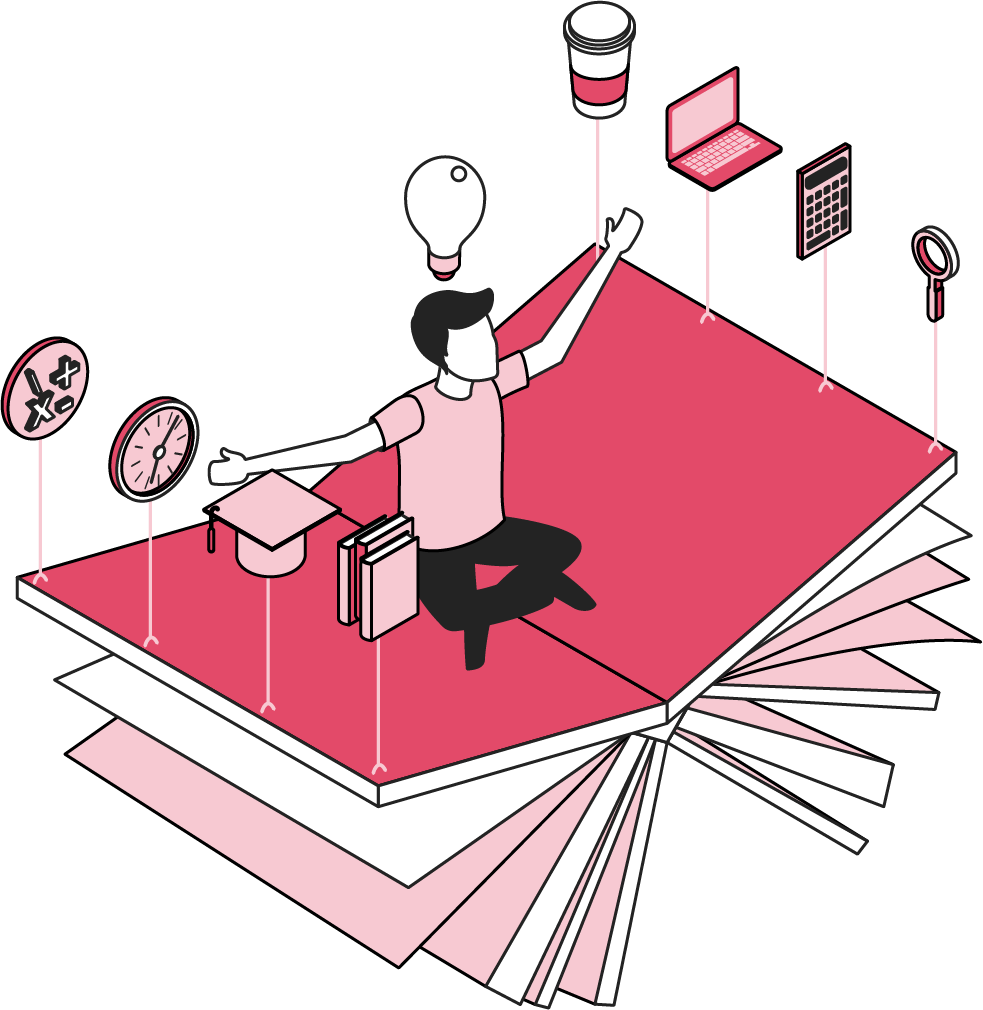
GLS Ultimate Guide To Legal Operations
Download this and read it thoroughly and regularly. It is a wonderful transformation companion.
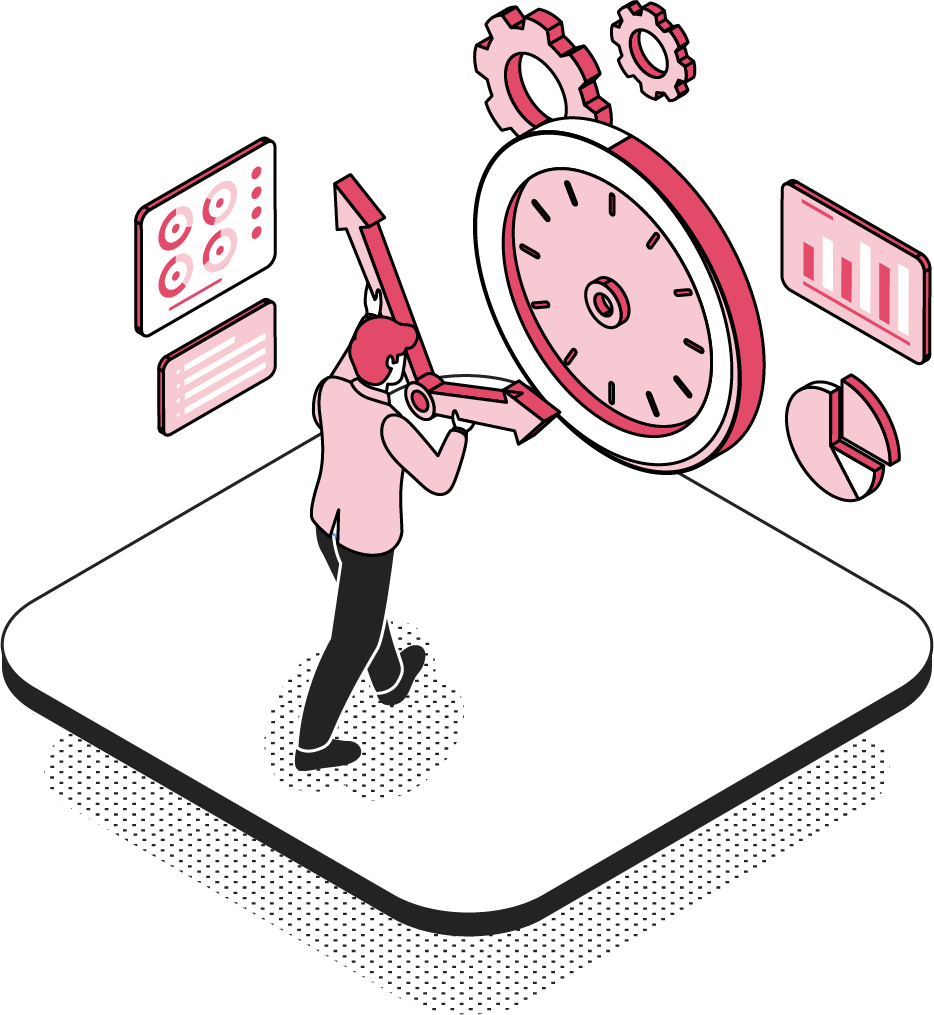
Book A No-Obligation Consultation
If you would like discuss your legal transformation needs, please book a 30 minute free consultation with us.
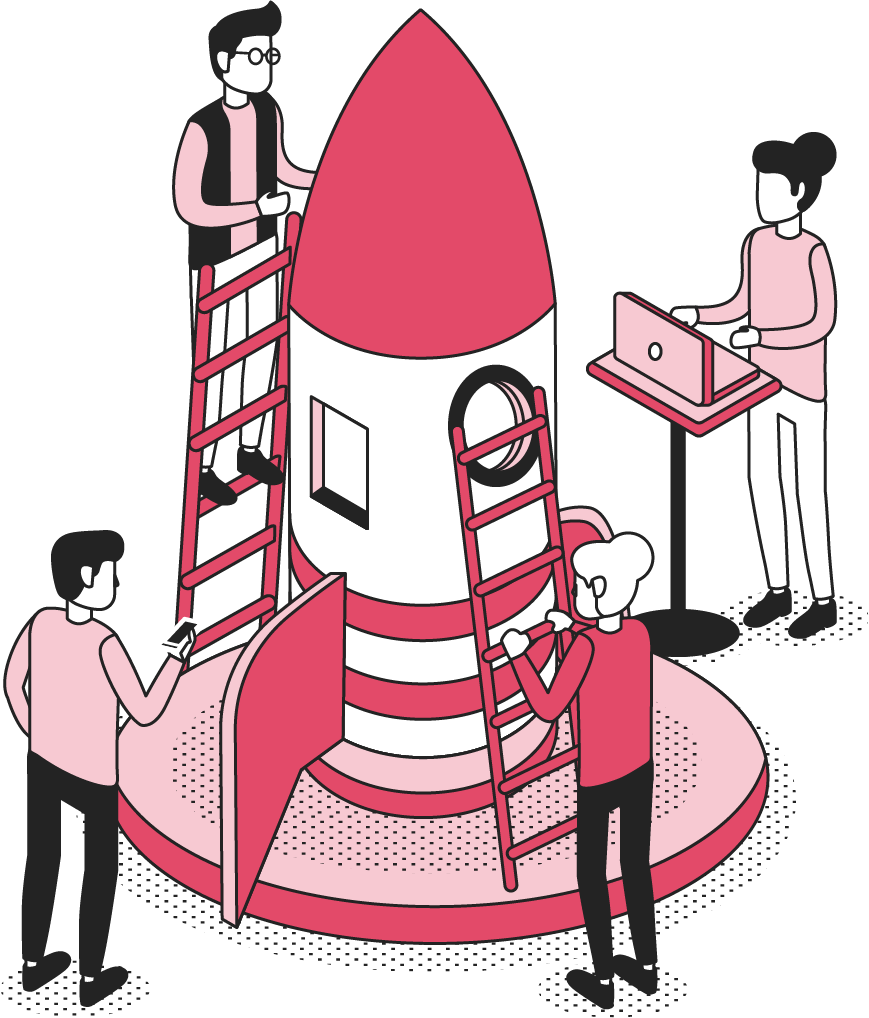
GLS Legal Transformation Boot Camp
Our hugely successful, 10-week long, email-based boot camp on how to effectively transform your legal team.


